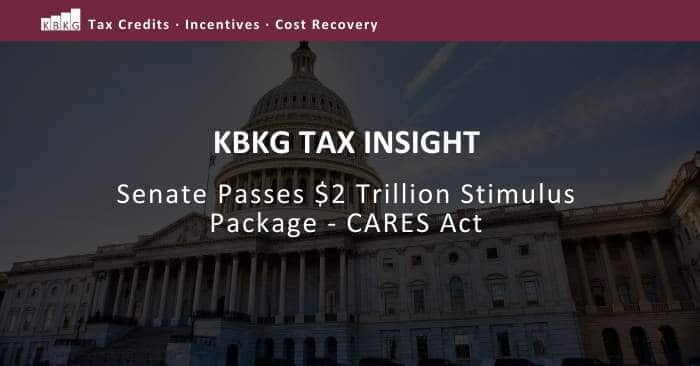For the most up-to-date information on Qualified Improvement Property, see our latest post.
On March 25, the Senate unanimously approved the Coronavirus Aid, Relief, and Economic Security (CARES) Act and sent it to the House for voting. If passed by the House, the President is expected to sign into law. The bill includes the following:
Business Tax Provisions
- Refundable credit for retaining employees: Employers are eligible for a credit based on 50 percent of qualified wages paid up to $10,000 during the crisis. It would be available to employers whose businesses were disrupted due to virus-related shutdowns and firms experiencing a decrease in gross receipts of 50 percent or more when compared to the same quarter last year. The credit is available for employees retained but not currently working due to the crisis for firms with more than 100 employees, and for all employee wages for firms with 100 or fewer employees.
- Qualified improvement property (QIP) technical correction: Provides 100% bonus depreciation for costs associated with the interior improvement of non-residential property by changing the tax life from 39-years to 15-years (and made retroactive for improvements after January 1, 2018).
KBKG Insight: Guidance on how to retroactively claim missed bonus depreciation from QIP may be needed. Additionally, for interior improvements to any property, taxpayers still need to segregate qualifying QIP costs from non-qualifying costs.
- Net operating loss (NOL) carryback allowed: NOLs generated in 2018, 2019, or 2020 can be carried back five years. Additionally, the 80% limit on NOLs is suspended to allow an NOL to fully offset income.
KBKG Insight: Taxpayers can get refunds by using a Change of Accounting Method (using a Form 3115) to maximize losses in the current tax year and carry back to years with taxable income.
- Delay of estimated tax payments: Corporations can postpone estimated tax payments (due after the date of enactment) until October 15, 2020.
- Delayed payment of employer payroll taxes: Social Security taxes for both employers and self-employed individuals can be paid over the following two years, with half of the amount required to be paid by December 31, 2021 and the other half by December 31, 2022.
KBKG Insight: IRC Section 41(h) allows for qualified small businesses to use up to $250,000 in research credits as an offset to the FICA portion of their payroll taxes. While the modification of the law allows employers to defer these amounts, qualified small businesses can continue to use the research credit as a permanent reduction in their FICA tax liability.
- Losses for taxpayers other than corporations: The provision modifies the loss limitation applicable to pass-through businesses and sole proprietors, so they can benefit from the NOL carryback rules described above.
- Net interest deduction limitation: Temporarily increases the amount of interest expense businesses are allowed to deduct on their tax returns, by increasing the 30-percent limitation to 50 percent of the taxable income for 2019 and 2020.
- Credits for prior year minimum tax liability of corporations: The corporate AMT was repealed as part of the Tax Cuts and Jobs Act, but corporate AMT credits were made available as refundable credits over several years, ending in 2021. The provision accelerates the ability for companies to recover those AMT credits.
- Section 965 Repatriation Toll Charge: Section 965 imposed a tax on the untaxed foreign earnings of U.S. companies in 2017 allowing the option to pay installments over eight years. Some companies overpaid their 2017 taxes as a result of Section 965, but were unable to claim a refund of those taxes due to an interaction with the rules for electing installment payments. This provision allows companies to recover the overpayment of taxes paid on the toll charge.
- Restoration of limitation on downward attribution of stock ownership in applying constructive ownership rules: Addresses the tax treatment of certain foreign subsidiaries resulting from changes made by the Tax Cuts and Jobs Act. The provision clarifies that certain foreign subsidiaries should not be subject to excessive tax and reporting requirements and will permit companies to amend their 2018 tax return.
- Alcohol used in hand sanitizer: Suspends the excise tax for alcohol used in hand sanitizer for tax year 2020.
- Commercial Aviation: Suspends excise taxes for commercial aviation until January 1, 2021.
Individual Tax Provisions
- Recovery rebates for individuals: Checks of up to $1,200 will be put into the hands of most single taxpayers and $2,400 for joint filers. Those amounts increase by $500 for every child. Checks are reduced for higher income taxpayers and begin phasing out after a single taxpayer has $75,000 in adjusted gross income and $150,000 for joint filers (based off 2018 tax returns). For taxpayers without children, it phases out entirely at $99,000 for single filers and $198,000 for joint filers.
- Retirement account distributions: Waives the 10% early withdrawal penalty for distributions up to $100,000 from qualified retirement accounts for coronavirus-related purposes. In addition, income attributable to such distributions would be subject to tax over three years, and the taxpayer may recontribute the funds to an eligible retirement plan within three years without regard to that year’s cap on contributions.
- Charitable contributions: The bill allows for a $300 above-the-line charitable deduction for filers taking the standard deduction and increases limits charitable contributions for individuals who itemize and corporations.
- Employer-provided educational assistance: Employer payments of student loans, up to $5,250 annually, on behalf of employees are excluded from an employee’s taxable income.
KBKG offers a number of ways to generate tax deductions and credits that can be carried back to prior years under the CARES Act. To find out if you qualify visit: » kbkg.com/qualify
Author: Gian Pazzia, CCSP
Additional details of Business Tax Provisions
Full details of the Coronavirus Aid, Relief, and Economic Security (CARES) Act
Download KBKG Tax Insight: Senate Passes $2 Trillion Stimulus Package – CARES Act


